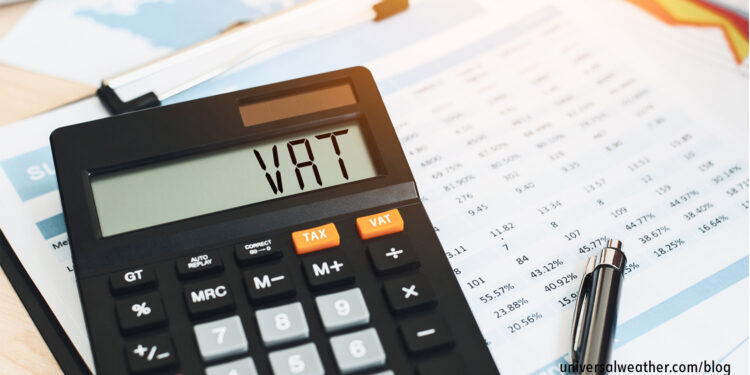UK Value Added Tax (VAT): Ground Handling Charge Exemptions

When business operators fly to the UK, there are opportunities to exempt Value-Added Tax (VAT) charges upfront. This can represent considerable operational savings. We find, however, that there’s often a lack of awareness of potential tax saving among operators who do not travel to the UK on a routine basis.
The following is an overview of what you need to know:
1. Benefits of zero-rating or exempting VAT
Being able to zero-rate or exempt VAT on services related to your flight to the UK can represent significant cost savings, on all service charges incidental to travel for a business flight to the UK. With current UK VAT rate at 20%, savings on handling, parking, ramp services, in-flight catering, and hotels can be considerable. However, you won’t be able to take advantage of these exemptions without taking certain steps in advance. Therefore, it’s important to work with your 3rd-party provider to understand all options and applicable requirements for VAT exemption prior to operating to the UK.
2. VAT basics
VAT is charged on most goods and services provided by VAT registered businesses in the UK. The VAT rate has been at 20% since January of 2011, and there’s talk of increasing this rate in future. The regulations can be somewhat complex in terms of specific exemptions. In the UK VAT rate is zero-rated (0%), for VAT-registered UK commercial operators. VAT exemption opportunities also exist for non-UK commercial operators. It’s necessary to look at the status of the operator receiving the services to determine applicable VAT exemptions. UK Finance Bill 2010 and Article 148-E encompass applicable legislation for VAT exemptions.
3. VAT savings
A UK commercial operator with an Air Operator Certificate (AOC), together with UK military operators, are eligible to zero-rate VAT. Likewise, European Union (EU) and non-EU based operators who can prove they’re commercial operators, and have AOCs may also take advantage of receiving services exempt from UK VAT. Keep in mind that in order to be exempt or zero-rated for VAT, you’ll need to provide documentation in advance to receive any services zero-rated or exempt from VAT at the source.
4. Fuel vs. services VAT exemptions
UK VAT exemption requirements for fuel uplifts differ from aircraft services exemptions. Separate declarations are involved for these two types of VAT exemptions, and it’s important to confirm all applicable rules with your 3rd-party service provider in advance.
5. VAT exemption on services
If you’re operating a flight for business and have correct documentation, it’s possible to exempt VAT at point of sale on all services related to your flight. This includes not just handling charges but all airside ramp services, catering, local transport, and crew hotel accommodations. Even if you’re making one or two stops in the UK, but your flight operation is primarily international, UK VAT may be zero-rated or services provided may be exempt from VAT. It’s important to keep in mind, however, that documentation must be furnished in advance in order to take advantage of VAT exemptions. Also, your invoicing needs to be clear on what taxes are applicable or not. Please note that the EU exemption rules are interpreted differently by individual EU member states. Some countries will not apply the exemption to landside services such as transport or catering.
6. Recent rule changes
In the past VAT was exempt for any aircraft with a maximum takeoff weight of over 8 metric tons (17,650 lbs.), without any additional considerations such as type of flight. Recent changes to regulations, however, have made this more complex, and you’ll now need to prove your flight is for business and that you have acceptable tax ID information on file. You’ll also need to confirm annually, with your 3rd-party provider, the business status of you as an operator in order to receive ongoing VAT exemptions.
7. Finer points of VAT exemptions
In order to exempt VAT on flight-related services, including local transport and hotel accommodations, your service provider must be VAT-registered and pay the charges on your behalf in order to exempt VAT at point of sale. If non-UK-based operators obtain services in the UK and pay for those services on their own, they’ll be charged 20% VAT at point of sale. Although qualifying operations have the ability to reclaim VAT, at a later date, this is usually done via a VAT reclaim service provider. These providers typically charge 20-30% of taxes recovered.
Conclusion
It’s best to speak with your service providers regarding operations to the UK and what taxes you may be able to exempt. It’s also important to understand all tax exemption requirements. To take advantage of zero-rated or exempt VAT in the UK, you’ll need to provide documentation to your service provider in advance. You’ll also need to declare status of your flight operations on an annual basis. The good news is that UK VAT exemptions can be significant and well worth the effort to obtain.
Questions?
If you have any questions about this article or would like more information on UK exemptions, contact me at leighhawes@univ-wea.com.




